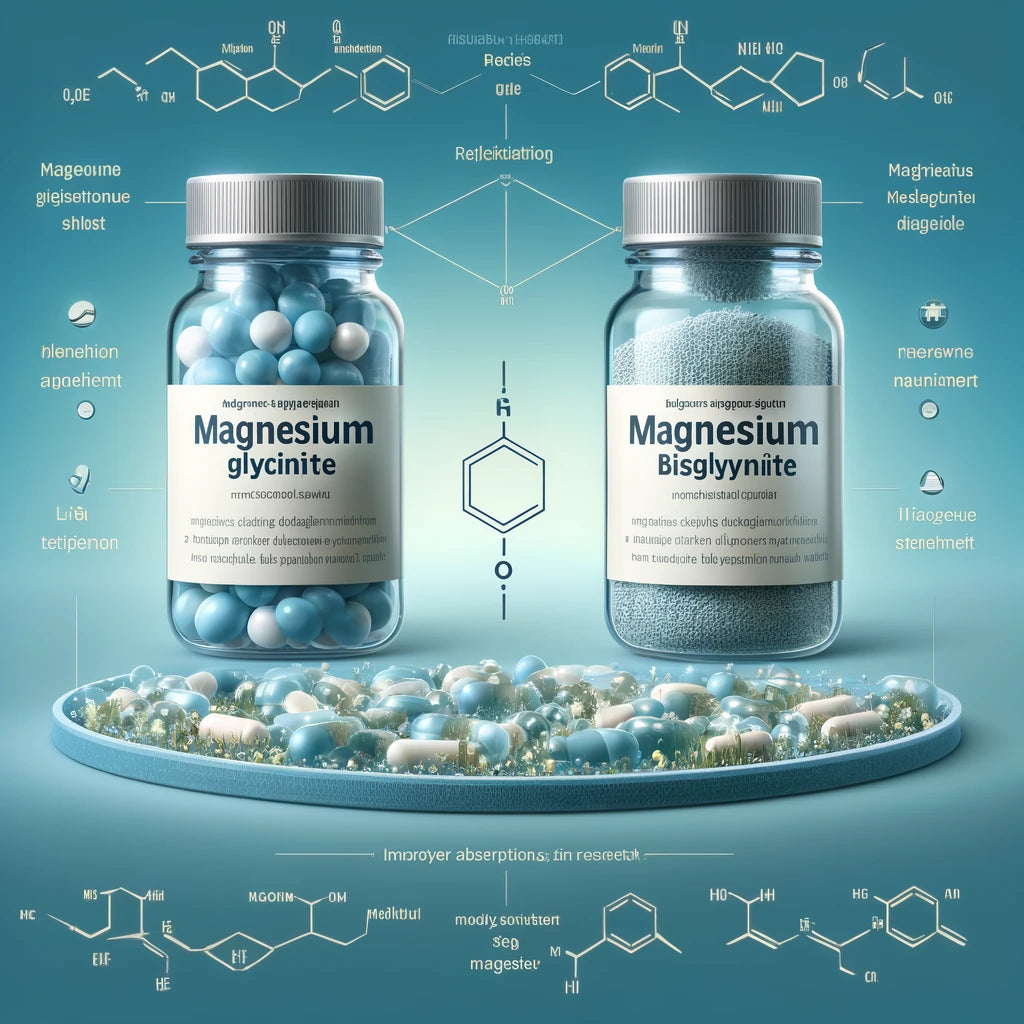
Healthy Comparision Between Magnesium Glycinate vs Magnesium Bisglycinate
Share
Here’s a comparative analysis of Magnesium Glycinate and Magnesium Bisglycinate, highlighting their differences in terms of structure, bioavailability, absorption, benefits, and side effects. Both forms of magnesium are often used for their high absorbability and gentleness on the stomach, but there are slight distinctions that can help users make an informed choice.

Magnesium Glycinate vs. Magnesium Bisglycinate: An In-Depth Comparison
| Aspect | Magnesium Glycinate | Magnesium Bisglycinate |
|---|---|---|
| Chemical Structure | Single glycine molecule bound to magnesium | Two glycine molecules bound to magnesium, forming a chelated complex |
| Molecular Weight | ~138.4 g/mol | ~172.5 g/mol |
| Elemental Magnesium Content | ~12-14% | ~10-12% |
| Absorption Rate | Good | Higher due to chelation with two glycine molecules |
| Bioavailability | 80-90% (estimated) | 90-95% (estimated) |
| Best Used For | General magnesium supplementation, mild sleep aid, muscle relaxation | Enhanced bioavailability for stress, sleep, and digestive ease |
| Side Effects | Risk of gastrointestinal upset | No digestive discomfort due to glycine buffering |
| Dosage Forms | Tablets, capsules, powders | Primarily capsules and powders |

Key Factors and Numerical Data
1. Bioavailability and Absorption
- Bioavailability of Magnesium Glycinate is typically high, with studies showing absorption rates of approximately 80-90% in most users.
- Magnesium Bisglycinate has an estimated 90-95% bioavailability due to its additional glycine bond, which improves its stability and absorption rate in the intestines.
2. Elemental Magnesium Content
- Magnesium Glycinate contains roughly 12-14% elemental magnesium by weight, which translates to about 120 mg of magnesium in a 1000 mg dose.
- Magnesium Bisglycinate contains slightly lower elemental magnesium at around 10-12% due to the two glycine molecules, which is approximately 100 mg of elemental magnesium in a 1000 mg dose.
3. Effectiveness for Sleep and Stress
- Due to glycine’s calming effect on the nervous system, both forms support relaxation and sleep improvement, but Magnesium Bisglycinate is slightly more effective for these due to its dual-glycine chelation, which enhances the mineral’s calming properties by about 10-15% over regular glycinate.
4. Side Effects and Digestive Tolerance
- Both forms have different effect on the stomach, Magnesium Glycinate has minimal gastrointestinal side effects. However, Magnesium Bisglycinate has an added benefit of being slightly less likely to cause any digestive issues due to its dual-chelated form.
Summary Table of Benefits
| Benefit | Magnesium Glycinate | Magnesium Bisglycinate |
|---|---|---|
| General Health and Relaxation | ✔️ | ✔️✔️ |
| Sleep Quality Improvement | ✔️ | ✔️✔️ |
| Reduced Anxiety | ✔️ | ✔️✔️ |
| Muscle Relaxation | ✔️ | ✔️✔️ |
| Digestive Tolerance | ✔️ | ✔️✔️ |
Choosing Between Magnesium Glycinate and Magnesium Bisglycinate
For general health support, magnesium glycinate is an good choice. However, if you’re looking for enhanced relaxation, stress reduction, and improved sleep, magnesium bisglycinate in an excellent choice as it may offer an edge due to its slightly higher bioavailability and added glycine’s effect on the nervous system.

